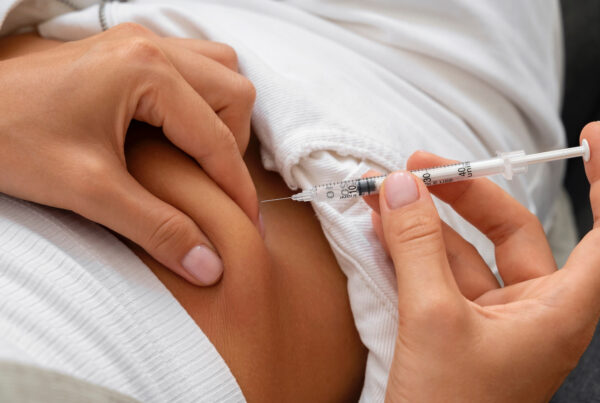In the study Low-dose ketamine infusion in treatment-resistant double depression: Revisiting the adjunctive ketamine study of Taiwanese patients with treatment-resistant depression (Chen et al., 2021), researchers investigated the antidepressant and antisuicidal effects of ketamine in a particularly challenging subset of patients: those suffering from treatment-resistant double depression. This condition involves the coexistence of major depressive episodes superimposed on chronic dysthymia, and is notoriously difficult to treat with conventional antidepressants.
The study provides evidence that a single infusion of 0.5 mg/kg ketamine can lead to rapid symptom improvement in both depressive severity and suicidal ideation in this population. These results offer an important glimpse into how ketamine may be tailored to meet the needs of patients who have historically had few effective treatment options.
Understanding Double Depression
Double depression refers to the co-occurrence of persistent dysthymia and episodic major depressive disorder (MDD). Patients experience a baseline of chronic low mood with intermittent episodes of more severe depressive symptoms. This layered form of depression is associated with:
- High treatment resistance
- Elevated suicide risk
- Poor quality of life and functioning
Traditional antidepressants often provide only partial relief. Therefore, fast-acting interventions like ketamine are particularly relevant in this setting.
Study Design and Participant Breakdown
The study enrolled 35 Taiwanese patients with confirmed treatment-resistant double depression. They were randomly assigned to one of three groups:
- 12 patients received 0.5 mg/kg ketamine
- 11 patients received 0.2 mg/kg ketamine
- 12 patients received normal saline (placebo)
All infusions were administered intravenously over 40 minutes. Researchers monitored outcomes at multiple time points:
- Baseline (pre-infusion)
- 40 and 240 minutes post-infusion
- Daily from Day 2 to Day 7, and again on Day 14
The primary measure used was the 17-item Hamilton Rating Scale for Depression (HDRS).
Rapid Antidepressant Effects at 0.5 mg/kg
The key finding was that a single infusion of 0.5 mg/kg ketamine significantly reduced HDRS scores compared to placebo (p = 0.031). This rapid reduction in depressive symptoms occurred within hours of infusion and remained observable over the two-week follow-up period.
In contrast, the 0.2 mg/kg dose did not produce a significant effect, suggesting that this lower dose is insufficient for individuals with such chronic and severe pathology.
Antisuicidal Effects Observed
Another critical outcome was the impact on suicidal ideation, measured by item 3 of the HDRS. The 0.5 mg/kg ketamine group experienced a statistically significant reduction in suicidal thoughts (p = 0.033), reinforcing findings from prior studies that ketamine can rapidly alleviate suicidality.
This is especially important given the elevated suicide risk associated with double depression. Rapid-acting interventions are crucial in this context, where traditional antidepressants can take weeks to show benefit.
Safety and Tolerability
Although this study did not focus in detail on adverse effects, previous trials and clinical reports have consistently shown that low-dose ketamine is generally well tolerated. Common side effects include:
- Mild dissociation
- Nausea
- Dizziness
Importantly, no participants in this study discontinued treatment due to side effects, suggesting that ketamine was safe and feasible in this setting.
Clinical Implications
This study highlights several practical considerations for clinicians treating complex depressive conditions:
- Dosing matters: A 0.5 mg/kg dose appears effective, while lower doses may fall short in severe populations.
- Speed is essential: Ketamine’s rapid onset offers a distinct advantage for individuals at high suicide risk.
- Treatment-resistant subtypes need targeted approaches: Double depression requires more aggressive and specialized treatment than episodic MDD alone.
The study supports incorporating adjunctive ketamine infusions into the treatment algorithm for patients who have failed multiple conventional therapies.
Limitations and Areas for Future Research
Though promising, this study also has limitations:
- Small sample size (n = 35)
- Short follow-up period (only 14 days)
- Lack of detailed side effect profiling or long-term safety data
Future studies should examine:
- The efficacy of repeated infusions over time
- Long-term maintenance strategies
- The role of combination therapies, such as pairing ketamine with cognitive behavioral therapy
These steps will help clarify how ketamine can be best integrated into chronic depression management.
Conclusion
The study Low-dose ketamine infusion in treatment-resistant double depression adds to the growing body of literature on ketamine’s antidepressant effects by zeroing in on a particularly hard-to-treat population. A single infusion of 0.5 mg/kg ketamine delivered rapid improvements in depressive symptoms and suicidal ideation, whereas a 0.2 mg/kg dose was ineffective.
For patients struggling with long-term, treatment-resistant depressive disorders, these findings offer a glimmer of hope—and point to ketamine as a viable, rapid-onset option that can be safely administered in a clinical setting. As research advances, ketamine may become a foundational element in the care of those with complex and chronic mood disorders.
References
- Chen MH, Wu HJ, Li CT, et al. Low-dose ketamine infusion in treatment-resistant double depression: Revisiting the adjunctive ketamine study of Taiwanese patients with treatment-resistant depression. Hum Psychopharmacol. 2021;e2820. https://doi.org/10.1002/hup.2820
- Zarate CA, Singh JB, Carlson PJ, et al. A randomized trial of an N-methyl-D-aspartate antagonist in treatment-resistant major depression. Arch Gen Psychiatry. 2006;63(8):856–864. https://doi.org/10.1001/archpsyc.63.8.856
- Berman RM, Cappiello A, Anand A, et al. Antidepressant effects of ketamine in depressed patients. Biol Psychiatry. 2000;47(4):351–354. https://doi.org/10.1016/S0006-3223(99)00230-9
- Murrough JW, Iosifescu DV, Chang LC, et al. Antidepressant efficacy of ketamine in treatment-resistant major depression: a two-site randomized controlled trial. Am J Psychiatry. 2013;170(10):1134–1142. https://doi.org/10.1176/appi.ajp.2013.13030392
Wilkinson ST, Ballard ED, Bloch MH, et al. The effect of a single dose of intravenous ketamine on suicidal ideation: a systematic review and individual participant data meta-analysis. Am J Psychiatry. 2018;175(2):150–158. https://doi.org/10.1176/appi.ajp.2017.17040472




